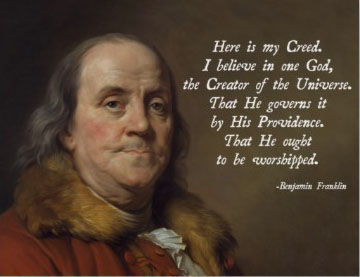Benjamin Franklin On Religion
|
| updated |
Copy Link Code
|
 Benjamin Franklin was, above all, tolerant and supportive of all religions that promoted moral strength and virtue. Although he was born into a devout Puritan family in Boston, Massachusetts, the first adult declarations of Benjamin Franklin on religion identified him as a Deist. Deism was a movement born out of the Enlightenment in Europe that saw divine intelligence behind the complex and wondrous beauty of the natural world but did not believe that God intervened in human activity through prophecy or miracles. Organized religion was not viewed by Deists as necessary for good people to be moral or connect with the divinity. For Benjamin Franklin, religious beliefs were important to hold, but he did not mind which beliefs they were. He was a proponent of the constant addition of churches in Philadelphia from all sects and denominations and even pushed a motion for daily common prayer at the Constitutional Convention in 1787. Importantly for young Ben Franklin, religious beliefs included inspiration from the Puritan preacher Cotton Mather who established a morality through voluntarism; throughout his life, Franklin would profess the benefits of doing voluntary work for the community, leaving a mark that survived in the birth of American culture.
Benjamin Franklin was, above all, tolerant and supportive of all religions that promoted moral strength and virtue. Although he was born into a devout Puritan family in Boston, Massachusetts, the first adult declarations of Benjamin Franklin on religion identified him as a Deist. Deism was a movement born out of the Enlightenment in Europe that saw divine intelligence behind the complex and wondrous beauty of the natural world but did not believe that God intervened in human activity through prophecy or miracles. Organized religion was not viewed by Deists as necessary for good people to be moral or connect with the divinity. For Benjamin Franklin, religious beliefs were important to hold, but he did not mind which beliefs they were. He was a proponent of the constant addition of churches in Philadelphia from all sects and denominations and even pushed a motion for daily common prayer at the Constitutional Convention in 1787. Importantly for young Ben Franklin, religious beliefs included inspiration from the Puritan preacher Cotton Mather who established a morality through voluntarism; throughout his life, Franklin would profess the benefits of doing voluntary work for the community, leaving a mark that survived in the birth of American culture.
Was Benjamin Franklin a Christian? Yes, he never gave up believing in Jesus Christ which was completely compatible with his Deists views. Although he was willing to criticize the structure and role of the Church throughout the history of Christianity, Franklin saw this as a failure of man instead of a lack of divinity in Christ. When Thomas Paine made his famous comments against all religion, Franklin joined the chorus of Founding Fathers to condemn his opinion. One of the famous Benjamin Franklin quotes on religion emerged from his response to Paine's comments; Franklin asked, "If men are so wicked with religion, what would they be if without it?" In the earliest formative years of the United States, Franklin voiced his concern about the stability of any nation without a virtuous population. Although he would never pick one religion as superior to others, he did understand the usefulness of religion in building a stronger society and thus, a stronger nation. Only a month before his death, Franklin replied to a question on his religion from the President of Yale University by stating that he viewed Christ's "system of morals and His religion" as the best the world had ever seen, but had "some doubts as to his divinity." The dying Franklin joked that further study was not necessary because he would "expect soon an opportunity of knowing the truth with less trouble."
Benjamin Franklin, Christian Deist, helped establish the tolerance for religious difference that became a cornerstone of the United States. Throughout the life of Benjamin Franklin, beliefs he held were malleable to the influence of new thinking and the radical philosophy of groups such as the Dissenters in England. John Adams was impressed with Franklin's ability to appease all religious people and said that many left with the impression that Franklin adhered to their religion as well. He was open to new interpretations and never judgmental of another man's beliefs.
